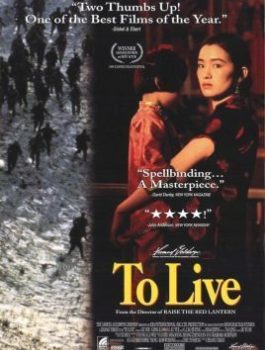The movie follows the struggles of a Chinese family through the decades of war, revolution, and social upheaval in the mid-20th century. It portrays the cyclical nature of life, how people experience joy and sorrow, and how the wheel of fortune turns and fortunes change. The movie promotes the importance of family, resilience, and hard work while being critical of the Communist Party of China (CPC) and its control over society. Overall, “To Live” is a poignant and thought-provoking exploration of the human experience in the face of adversity.
“To Live” tells the story of a Chinese family struggling to survive the turbulent decades of the mid-20th century, through the Second Sino-Japanese War, the Chinese Civil War, and the Cultural Revolution. The story follows Fu Gui (Ge You), a gambling addict who loses his family fortune. His gambling forces his pregnant wife, Jia Zhen (Gong Li), to leave home with their daughter Feng Xia and unborn son You Qing. Fu Gui eventually cleans up his act and takes up shadow puppet theatre with Chun Sheng from the same village, only to be drafted by the Nationalist army and later taken prisoner by the Communists. Fu Gui and Chun Sheng make a pact to return alive and after all the hardships, Fu Gui finally returns home safely only to find that this mother has died, and his daughter Fengxia has become mute due to illness.
Misfortune never lets go of the Fugui family and they continue to live in poverty and misery. Chun Sheng is persecuted during the Cultural Revolution, and his wife commits suicide. Later, Fu Gui’s daughter Fengxia meets Erxi, a loyal and honest man, and the two are happily married. However, Fengxia gives birth to a son, but she dies during childbirth.
The movie portrays a powerful message of the importance of family, resilience, and survival during times of struggle and despair. Throughout the film, the audience witnesses the family’s struggles facing famine, disease, and political oppression. Despite these challenges, the family members support and love one another, providing hope and strength in adversity. The movie also highlights the cyclical nature of life: how people experience both joy and sorrow and how fortunes change over time. The film portrays the importance of resilience and adaptation, encouraging viewers to prepare for good and bad times.
“To Live” also promotes several values and norms considered important in Chinese society. Family values, such as filial piety and loyalty, are depicted as essential to a person’s identity and well-being. The movie also highlights the significance of diligence, persistence, and resolve.
One of the movie’s key themes is the impact of war and political turmoil on ordinary people. The film shows how the wars and revolutions of the 20th century have shaped the lives of millions of Chinese people. It depicts how political upheavals, such as the Cultural Revolution, have devastated ordinary people’s lives, leading to the loss of loved ones, the destruction of property, and the breakdown of social stability.
The movie portrays the Communist Party of China (CPC) and its control over society in a critical light. It illustrates how the CPC’s policies and actions have profoundly impacted ordinary people’s lives, causing economic devastation, famine, and political oppression. The film also details how the Party’s political campaigns, such as the Cultural Revolution, destroyed traditional values and social norms.
The movie’s leading character, Fugui, experiences the impact of political and social change first-hand. He initially leads a carefree and extravagant life as a wealthy landlord, but the Chinese Civil War and subsequent Communist revolution change his life dramatically. He loses his wealth, becomes a victim of political oppression, and struggles to provide for his family during famine and economic hardship. Fugui’s story reflects the social changes in China between the 1940s and 1970s. One of the most profound changes was the shift from a feudal agricultural society to an industrialised one, which dismantled traditional social norms and values.
It can be said that the state of these lives reflects the historical context and reveals the feeling of helplessness evident in the lives of common Chinese citizens.
The movie was banned for its depiction of the Communist Party and according to an article in Screen International, a film making ban of two years was placed on Zhang Yimou as well. The ban on the movie in mainland China was lifted in the late 2008. The film has been shown at several international film festivals but is yet to become widely available in China. The ban is believed to have been imposed due to the movie’s portrayal of the Cultural Revolution, a sensitive period in Chinese history.
Overall, “To Live” is a powerful movie portraying ordinary Chinese people’s struggles and challenges during significant social, political, and economic turmoil. The film highlights the importance of family, resilience, and adaptation to adversity. It also criticises the CPC’s policies and actions, highlighting their negative impact on the lives of ordinary people.



Author
Bablu Kumar Singh
Bablu Kumar Singh is a research scholar at the Centre for Chinese and South East Asian Studies, Jawaharlal Nehru University (JNU), India. His current research focuses on “Perceptions and Images of India in Chinese Discourse: A Study of Select Contemporary Chinese Writings”. His research interests include perceptions and images of China’s Indologists on Contemporary India, India-China civilizational interactions and India-China relations under Xi Jinping.